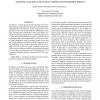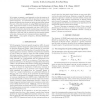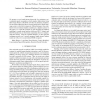334 search results - page 25 / 67 » Improving speech playback using time-compression and speech ... |
ICASSP
2011
IEEE
13 years 6 days ago
2011
IEEE
Dysarthria is a motor speech disorder resulting from neurological damage to the part of the brain that controls the physical production of speech and is, in part, characterized by...
CSL
2010
Springer
13 years 8 months ago
2010
Springer
We propose a unified global entropy reduction maximization (GERM) framework for active learning and semi-supervised learning for speech recognition. Active learning aims to select...
ISCAS
2003
IEEE
14 years 1 months ago
2003
IEEE
The most popular speech feature extractor used in automatic speech recognition (ASR) systems today is the mel frequency cepstral coefficient (mfcc) algorithm. Introduced in 1980,...
ICASSP
2010
IEEE
13 years 8 months ago
2010
IEEE
In this paper, we present a novel approach to relax the constraint of stereo-data which is needed in a series of algorithms for noise-robust speech recognition. As a demonstration...
ICASSP
2011
IEEE
13 years 6 days ago
2011
IEEE
We propose a novel multi-stream framework for continuous conversational speech recognition which employs bidirectional Long Short-Term Memory (BLSTM) networks for phoneme predicti...



